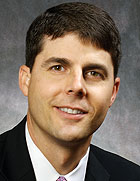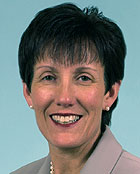Brent Matthews, M.D., associate professor of surgery, and Steve Hodgett, M.D., a fellow in the Section on Minimally Invasive Surgery, recently led a team of 11 health-care professionals on a surgical mission trip to the Dominican Republic.

Matthews
The team performed primarily hernia repairs but also performed other procedures to help Dominicans who lacked access to surgical care.
The idea to organize a surgical mission had been in the works for several years. When Matthews, chief of the Section of Minimally Invasive Surgery, first arrived at the School of Medicine and Barnes-Jewish Hospital in 2004, he and Peggy Frisella, minimally invasive surgery lab administrator, discussed their experiences volunteering in developing countries and worked together to plan a surgical mission trip.
Matthews and his team traveled to Santiago in late January. They worked in conjunction with the Institute for Latin American Concern (ILAC), a faith-based group that has a freestanding clinic with three operating rooms and five exam rooms.
ILAC has a system of health-care workers, called cooperadores, who live in remote villages and perform health screenings. The cooperadores brought surgical candidates to the clinic, where the WUSTL team examined them. Four team members spoke Spanish and were strategically placed in the exam room, pre-operative and postoperative areas.
Matthews, who routinely uses advanced laparoscopy to repair abdominal wall and inguinal hernias, and Hodgett performed traditional open surgery because of the limitations on the surgical equipment they could ship ahead of the trip. In addition, because most patients had a significant delay in surgical care, many of these hernias would not have been appropriate for minimally invasive techniques due to their large size and chronic nature.

Frisella
“The intent was to do something that we do clinically, in an outpatient setting, for which there was a great need,” Matthews said. “Hernias are quite common as manual labor and an agrarian lifestyle predominate for most Dominicans in rural areas.”
Along with Matthews and Hodgett, general surgery residents Eric Jenkins, M.D., and Lora Melman, M.D., assisted with the surgeries. Altogether, the team performed 61 surgeries on 53 patients with hernias and other conditions.
Other members of the team were Kathleen Miller, research coordinator; Kathryn Cook, veterinary technician; Susana Rodriguez-Ferrer, medical secretary; Wes Vega, a WUSTL alumnus; and Ross Thomas and Gosia Borchardt, anesthetists. The local Dominican health-care staff was critical in handling the flow of patients through the preoperative and postoperative areas.
The mission was made possible through grants from the Barnes-Jewish Foundation and Christian World Relief, a philanthropic group interested in supporting such mission work. The team also solicited donations of surgical equipment and supplies from private companies.
“Despite the rural setting, the care that we provided was similar to what we would do daily at the Center for Advanced Medicine in the same-day surgery center,” Matthews said. “I think the patients received the best care we could deliver.”
The team is planning another mission at the ILAC clinic in early 2010.